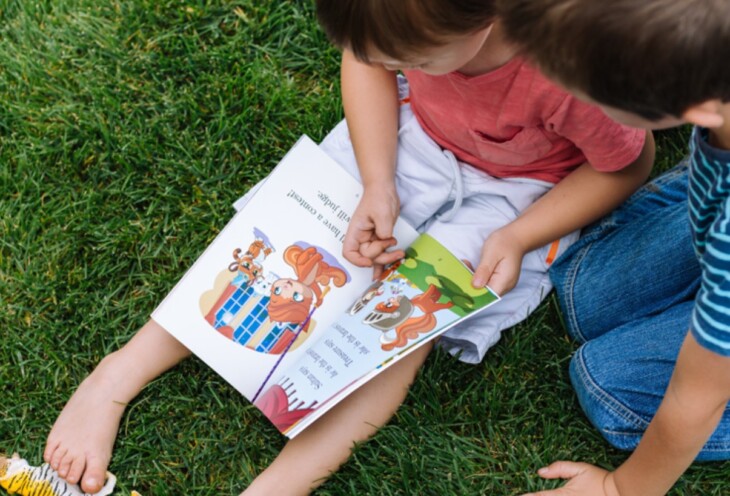The prolific author John Maxwell once said, ‘readers are leaders. Kids who want to become leaders in life must read lots of books–books that inform, inspire, and give insights. But the average American only reads 12 books a year, which isn’t enough. Bill Gates reads 50 books a year and Elon Musk used to read two books a day when he was a kid. No wonder they are so successful! This article discusses why reading is essential, and why your kid should read more.

Source: LeapFrog
Contents
1. It Enhances Creativity
Have you ever predicted a turn of events in a novel or solved a case in a mystery book before reading the conclusion? That’s what reading does for your child. It stimulates analytical thinking skills and helps a kid know how to solve problems, detect patterns, and assimilate new information–because they put themselves in the characters’ shoes.
Reading fiction helps kids practice how to keep their minds open because they understand uncertainty. Most people follow a set course of action; they don’t know how to think outside the box. By not reading, kids close their minds to information that could be helpful. Reading also boosts intelligence. The more a child reads, the more they learn, and the more they know, the more they understand. Children who understand more are brilliant.

Source: Mental Floss
2. It Builds Vocabulary and Understanding
When a child reads, they concentrate and understand what’s printed on the page. And by reading stories, they are exposed to a variety of words. They build their vocabulary and can understand more, which is a vital life skill. Even if your child can’t understand every word in a book, they’ll learn new words, phrases, and sounds which they can then try out.
As your child starts learning to read, keep them interested in books. Find out what they are interested in, then help them find engaging and fun books. Read the books they bring home from school together and encourage them as their vocabulary improves. If they are struggling to learn how to read, ReadabilityTutor can be very helpful.

Source: David Morgan Education
3. It Lowers Stress
When your child loses themself in a good book or reads about something they enjoy, they relax. According to research, it’s not just adults who get stressed, and kids do, too! Reading can reduce tension in the heart and muscles and let the brain wander to new places. It’s like a mini-vacation for your child’s brain, and it allows them to live someone else’s life. Reading can improve a child’s mental, academic, social, and physical life.
As a child reads, they start to imagine the characters. Some even create their little world. Reading enhances a child’s imagination by forcing them to picture what the characters look like.
Reading is an essential life skill. It’s required to understand most topics at school and to lead in life. Teach your child to read storybooks, magazines, and workbooks from a young age. The better they can read, the easier it will be to learn what’s taught in school.

Source: english
4. It Multiplies Experience
We don’t usually go through life at a breakneck rate. As a leader, developing something of worth requires time, and the process is generally tricky and messy.
Consider starting a family. Raising an infant takes about 20 years, and we still have a small number of kids to practice with. Older partners will tell you that building a healthy marriage takes a lifetime, and again there are few chances to practice. We will, however, benefit from the perspectives of nearly an infinite number of affluent parents and married people through reading.

Source: Phase2Parenting
5. It Supports Clear communication
The more vocabulary your kid has access to, the better they will be able to express themselves. As a result, there will be fewer miscommunications as a result of using incorrect terms. Furthermore, the greater their vocabulary, the better it would be to comprehend what people are saying to them. They won’t have to focus on a dictionary all the time while reading.

Source: Children’s Bureau
6. It Improves Language skills
Starting as early as childhood, reading to young kids regularly will assist with language comprehension, language skills, communication competence, and reading skills. That’s because reading to your kids from the beginning activates the portion of the brain that enables them to comprehend language and aids in the development of important vocabulary, learning, and interpersonal skills.
In reality, a reported brain scan study showed that reading to kids at home from a young age was closely linked to brain stimulation in areas related to sensory imagination and language comprehension.

Source: Medium
7. It improves concentration and discipline
Aside from developing shared time with your kids, incorporating daily reading time into your child’s routine has another benefit: improved discipline and focus. Young kids rarely remain still for extended periods, and it can be tough to get them to concentrate.
However, once you start reading to your children daily, you will see a difference in their attitudes. Toddlers may slither and become irritated during guided reading at first, but they will gradually learn to sit still for the remainder of the story.

Source: Maya Smart
8. It enhances ingenuity and imagination
Children are born with the ability to think big and use their imagination and creativity. Extensive reading to your child encourages them to use their dreams to discover characters, locations, times, and activities that are not familiar to them.
Reading as a creative experience will introduce your child to a variety of different worlds. Your child’s creativity will be widened, and he or she will be more likely to think big and act differently in the future, which will help their education, job, and life.
Summary
One of the most critical life skills to master is reading. It’s difficult to watch your children struggling with this important ability at any age, particularly if you don’t know how to assist them. Knowing how to learn isn’t often enough to teach anyone else successfully. That is why reading instructors from Learn Smart will be highly beneficial to you.
Participating in Reading programs will have a tremendous effect on a child’s overall learning, whether by igniting their creativity, giving them the courage to speak up in class, or improving their ability to understand and answer quizzes quickly.
